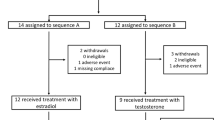Abstract
Androgen Insensitivity Syndrome represents a disorder due to partial (PAIS), mild (MAIS) or complete (CAIS) resistance to androgens caused by X-linked mutations of androgen receptor gene. CAIS is characterized by a female phenotype and XY karyotype. Cases of patients with CAIS and associated obesity have been reported, while to date, there are no reports about the onset of an Eating Disorder (ED) in the carriers of this condition. We describe the case of a patient affected by CAIS and Anorexia Nervosa (AN) restricting type later shifted to Bulimia Nervosa (BN). A previous overweight was present since childhood, contributing to severe Body Dissatisfaction (BD) and consequent restrictive behaviour in adolescence. Beyond its peculiarity, this case highlights also the importance of diagnosing and monitoring the overweight and BD in CAIS patients to avoid the onset of an ED.
Level of Evidence: V, descriptive study.

Similar content being viewed by others
References
Morris JM (1953) The syndrome of testicular feminization in male pseudohermaphrodites. Am J Obstet Gynecol 65:1192–1211
Gottlieb B, Trifiro MA (2017) Androgen Insensitivity Syndrome. In: Adam MP, Ardinger HH, Pagon RA, et al. (ed). GeneReviews® [Internet]. Seattle (WA) 1993–2020
Oakes MB, Eyvazzadeh AD, Quint E, Smith YR (2008) Complete androgen insensitivity syndrome – a review. J Pediatr Adolesc Gynecol 21(6):305–310
Lanciotti L et al (2019) Different clinical presentations and management in complete androgen insensitivity syndrome (CAIS). Int J Environ Res Public Health 16:1268. https://doi.org/10.3390/ijerph16071268
Petroli RJ, Hiort O et al (2018) Functional impact of novel androgen receptor mutations on the clinical manifestation of androgen insensitivity syndrome. Sex Dev 11:238–247
de Vries AL, Doreleijers TA, Cohen-Kettenis PT (2007) Disorders of sex development and gender identity outcome in adolescence and adulthood: understanding gender identity development and its clinical implications. Pediatr Endocrinol Rev 4(4):343–351
Bermúdez de la Vega JA, Fernández-Cancio M, Bernal S, Audí L (2015) Complete androgen insensitivity syndrome associated with male gender identity or female precocious puberty in the same family. Sex Dev 9(2):75–79
Wisniewski AB et al (2000) Complete androgen insensitivity syndrome: long-term medical, surgical, and psychosexual outcome. J Clin Endocrinol Metab 85(8):2664–2669
Rastogi R, Rome ES (2020) Restrictive eating disorders in previously overweight adolescents and young adults. Clev Clin J Med 87(3):165–171
Garner DM (1991) EDI-2. Eating disorder inventory-2. Professional manual. https://doi.org/10.1007/bf03327738
Beck AT et al (1961) An inventory for measuring depression. Arch Gen Psychiatry 4(6):561–571
Gormally J, Black S, Daston S, Rardin D (1982) The assessment of binge eating severity among obese persons. Addict Behav 7(1):47–55
Symptom Checklist-90-Revised". Pearson: Clinical Psychology. Pearson Education, Inc. Archived from the original on 13 May 2016
Cuzzolaro M, Vetrone G, Marano G, Garfinkel PE (2006) The body uneasiness test (BUT): development and validation of a new body image assessment scale. Eat Weight Disord-St 11:1–13
Yang P, Liu X, Gao J, Qu S, Zhang M (2018) Complete androgen insensitivity syndrome in a young woman with metabolic disorder and diabetes: A case report. Medicine 97(33):e11353. https://doi.org/10.1097/MD.0000000000011353
Dati E et al (2009) Body composition and metabolic profile in women with complete androgen insensitivity syndrome. Sex Dev 3:188–193
Batista RL (2018) Androgen insensitivity syndrome: a review. Arch Endocrinol Metab 62(2):227–235
Procopio M, Marriott P (2007) Intrauterine hormonal environment and risk of developing Anorexia Nervosa. Arch Gen Psychiatry 64(12):1402–1407
Culbert KM et al (2013) The emergence of sex differences in risk for disordered eating attitudes during puberty: a role for prenatal testosterone exposure. J Abnorm Psychol 122:420–432
Lombardo MV et al (2012) Fetal programming effects of testosterone on the reward system and behavioral approach tendencies in humans. Biol Psychiatry 72:839–847
Kopsida E et al (2009) The Role of the Y Chromosome in Brain Function. J neuroendocrinol 2:20–30. https://doi.org/10.2174/1876528900902010020
Engberg H et al (2017) Increased psychiatric morbidity in women with complete androgen insensitivity syndrome or complete gonadal dysgenesis. J Psychosom Res 101:122–127
Author information
Authors and Affiliations
Corresponding author
Ethics declarations
Conflict of interest
Disclosure of potential conflicts of interest: The authors declare that they have no conflict of interest.
Ethical standards
Research involving Human Participants and/or Animal: All procedures performed in studies involving human participants were in accordance with the ethical standards of the institutional and/or national research committee and with the 1964 Helsinki declaration and its later amendments or comparable ethical standards.
Informed consent
Written informed consent was obtained from the patient.
Additional information
Publisher's Note
Springer Nature remains neutral with regard to jurisdictional claims in published maps and institutional affiliations.
Rights and permissions
About this article
Cite this article
Manzato, E., Gualandi, M. & Roncarati, E. Complete androgen insensitivity syndrome (CAIS) and eating disorders: a case report. Eat Weight Disord 26, 2421–2426 (2021). https://doi.org/10.1007/s40519-020-01069-1
Received:
Accepted:
Published:
Issue Date:
DOI: https://doi.org/10.1007/s40519-020-01069-1




